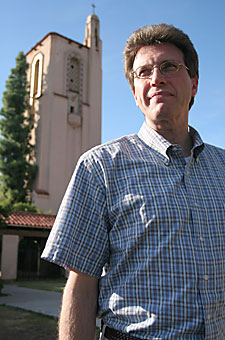 |
|
Cassandra Tomlin/Arizona Daily Wildcat
|
Sociology department head and professor Mark Chaves received a grant of more than $1 million to research the roles of churches, synagogues and mosques in society. Chaves said the findings of his first study showed the average church provided few social services to its members.
|
|
|
By Laura Ory
Arizona Daily Wildcat
Thursday, November 3, 2005
Print this
A UA sociology professor is about to find out what kind of role churches, synagogues and mosques play in society, after receiving more than $1 million for the research.
Mark Chaves, sociology department head and professor, received the grants to continue the National Congregations Study, the first nationwide survey of its kind, from the Lilly Endowment, the National Science Foundation and the W.K. Kellogg Foundation.
Chaves said he surveyed 1,200 religious congregations in 1998, and now he plans to survey the congregation officials about its range of activities and programs, social services, worship styles and membership characteristics.
“Religion is an important part of American society and culture and it’s important to study the role that religious groups and organizations play in our society,” Chaves said.
About 40 percent of Americans regularly attend a religious congregation and not enough is known about the effect religion has on our society, Chaves said.
“We don’t really know about what they do and how that role is changing,” Chaves said.
Information for the continued study will be gathered from the congregations he studied before and others that he has not yet contacted, Chaves said.
While there are many aspects of society and religion yet to be known, Chaves said, he was surprised with the findings of the first study that showed the average church provided few social services to its members.
He is particularly interested in seeing if that has changed over time, Chaves said.
The findings came as a surprise to Father Bartholomew Hutcherson, director of the Saint Thomas More Catholic Newman Center, who said he was sorry to hear few social services were being offered.
“Social services and social justice is one of the pillars of Christian faith,” Hutcherson said. “If social services aren’t being provided by churches, that is probably a reflection of American society.”
Shawna Anderson, a sociology graduate student who is one of four graduate students assisting with the study, said they are working to determine what new questions should be included in the surveys and will be conducting tests this winter to check the survey format for any problems.
By following up on the first study’s information, the researchers expect the next study will show what changes religious congregations have gone through over time, Anderson.
“We don’t have that kind of data in the field right now,” Anderson said.
While the researchers put the surveys together, the National Opinion Research Center at the University of Chicago will be conducting the surveys on the telephone during spring and summer.
The results will likely be published in 2007, Chaves said.
